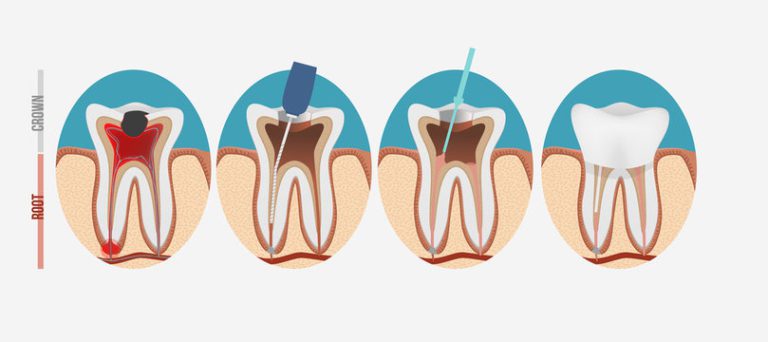Root Canal Treatment
- Home
- Root Canal Treatment

What is a root canal?
A root canal (endodontic therapy) is a dental treatment for infections in tooth pulp, the innermost layer of your teeth.
Why would I need a root canal?
You may need a root canal if bacteria inside your mouth invade the pulp inside your tooth and cause inflammation (pulpitis). Your tooth pulp may come under bacterial attack if:
- You have a deep cavity that needs treatment.
- You have a cracked or damaged tooth, and bacteria from plaque infects your tooth pulp
What happens after a root canal?
Your provider may suggest you rest for a few minutes before leaving the dental clinic or provider’s office. It can take an hour or more for anesthesia to wear off, meaning your mouth and gums aren’t numb anymore. Some people decide to rest at home while that happens while others choose to go on with their usual daily routine.
Typically, you’ll have two more appointments so a provider can prepare your tooth for a dental crown and then place the crown on your tooth.
What are the risks or complications of root canals?
Sometimes root canals fail because they weren’t the right solution for your tooth infection. For example, if your tooth is very damaged, a root canal may not solve your issues. If your root canal fails, your healthcare provider will discuss other options:
- Re-treating your infected tooth by doing another root canal.
- Removing (extracting) your infected tooth and replacing it with a dental implant or dental bridge.
Recovery and Outlook
How long does it take to recover from a root canal?
Typically, it takes less than a week to recover from a root canal. Call your healthcare provider if your treated tooth hurts for more than a week.
How do I take care of myself after a root canal?
- Your tooth and gums go through a lot during a root canal. You can help them heal by:
- Eating soft foods for the first few days after treatment. (Think well-cooked pasta, mashed potatoes, cottage cheese, smoothies and yogurt).
- Avoid chewing on your treated tooth if you’re waiting on your permanent crown.
- If you smoke, try to take a break after your root canal because smoking makes it harder for your tooth to heal.
- Brushing your teeth after every meal and flossing once a day.
- Using an antibacterial mouthwash to keep germs at bay.
Additional Common Questions
How can I avoid a root canal?
Practicing good oral hygiene and having regular dental checkups are the best ways to avoid root canal treatment. Brushing and flossing your teeth gets rid of dental plaque — a sticky film of bacteria that can cause cavities. Regular dental checkups mean your dentist can spot cavities and other issues early on before they affect your tooth pulp.
What happens if I delay root canal treatment?
Putting off root canal treatment increases the chance that:
- You’ll lose your infected tooth.
- The infection in your tooth pulp will spread to other teeth.
- The infection will spread to your jawbone.
Do root canals hurt?
Root canal treatment can be uncomfortable, mostly when your provider injects anesthesia into your gums and other parts of your mouth. Your provider wants you to be relaxed during treatment, so never hesitate to let them know if something hurts.
If you’re like most people, you’ll have less pain after treatment because it eliminated the infection that made your tooth hurt. Your tooth may feel sensitive for the first few days after treatment. That said, contact your provider right away if you have throbbing pain. Throbbing pain may mean there’s still infected pulp in your tooth.
